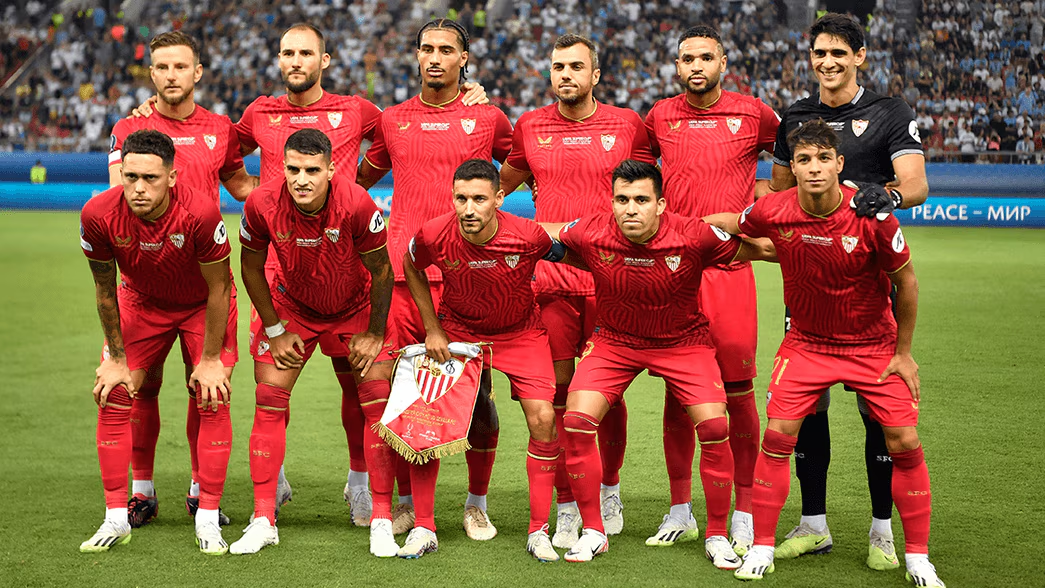The Champions League draw pitted us against Sevilla, a side with huge European pedigree and reigning Europa League champions.
But how much do you know about the Spanish side? We have pulled together everything you need to know about Los Nervionenses as our Champions League group heats up.
The history

Sevilla were founded in 1890, and are Spain’s oldest sporting club solely devoted to football. They played the first official match in the country against Huelva and would dominate the game in the south of the country in the early part of the 20th century, reaching the top-flight for the first time in 1933.
Their only league championship arrived in 1945/46 and a third Copa del Rey in 13 years arrived in 1948, but then the silverware dried up. They became a mid-table team, occasionally suffering relegation right up until the end of the century, but promotion in 2001 kick-started a period of huge success, especially in the Europa League which they’ve won seven times in the last 16 years.
That run began by thrashing Middlesbrough 4-0 in 2006, and 12 months later they pipped compatriots Espanyol on penalties. Having had future Tottenham manager Juande Ramos at the helm for those victories, Unai Emery would lead them to a hat-trick of successes, beating Benfica on spot-kicks in 2014, Dnipro in 2015 and a 3-1 triumph over Liverpool in 2016. A sixth arrived in 2020 after beating Inter Milan before last season’s triumph.
The stadium

Their home is the Ramon Sanchez Pizjuan Stadium, named after their former president and where they have played since 1958. It has a capacity of 42,714, making it the ninth-largest stadium in Spain.
It held matches in the 1982 World Cup including the infamous Germany v France semi-final, and the 1986 European Cup final that saw Steaua Bucharest beat Barcelona. It was also the venue for the 2022 Europa League final where Eintracht Frankfurt defeated Rangers on penalties.
Last season

A turbulent campaign for the club began when Julen Lopetegui was dismissed in October after winning just one of his first seven league games, and none of their opening three Champions League group games.
Former Argentina boss Jorge Sampaoli returned to the club for a second stint, but he would only last until March with his team two points above the relegation zone. He did though manage to secure third place in the Champions League group to qualify for the Europa League, and took them to the last eight before Jose Luis Mendilibar was handed the reins.
He steered them away from danger by winning six of his first eight La Liga games to ultimately secure a 12th-place finish, and beat Manchester United, Juventus and Roma to clinch the Europa League title once again for the club.
The manager

A poor start to the season cost Mendilibar his job, with Diego Alonso installed as Sevilla's fourth manager in 12 months. The former Uruguay striker enjoyed a prolific start to his career in his homeland and Argentina, earning him a move to Valencia in 2000. He helped Atletico Madrid win a Segunda title a year later courtesy of 22 goals, and would also represent Racing Santander, Malaga and Murcia plus enjoy stints in Mexico and China.
His coaching career began in Urugauy and Paraguay before he found success in Mexico. At Pachuca, he won a league title and CONCACAF Champions League, as well as guide them to a third-place spot in the 2017 Club World Cup, and then won a second Champions League with Monterrey. Alonso was named Inter Miami's first-ever head coach in 2019, and helped steer Urugauy into the 2022 World Cup, but resigned after a group stage exit.
The squad

The summer recruitment was headlined by veteran defender Sergio Ramos’ return to his first club following the expiration of his PSG contract, while Belgium international winger Dodi Lukebakio was acquired from Hertha Berlin.
There are plenty of former Premier League stars within their ranks, such as captain Jesus Navas who plays alongside his former Manchester City teammate Fernando. Ex-Tottenham Hotspur man Erik Lamela is now in his second season, while winger Suso played 21 times for Liverpool.
Moroccan attacker Youssef En-Nesyri is the dangerman having netted 18 goals in all competitions last season, and is their top scorer with four to his name so far this campaign. He scored twice in his nation’s run to the semi-finals of the 2022 World Cup, which was lifted by Argentina midfielder Marcos Acuna.
Croatian legend Ivan Rakitic still pulls the strings in midfield, while Serbian international goalkeeper Marko Dmitrovic spent 18 months at Charlton Athletic.
The season so far

Things couldn’t have started worse for Mendilibar, who found his team rock bottom of La Liga after three straight defeats. However, they looked to have picked up some form when they beat Las Palmas and Almeria at home between a goalless draw at Osasuna to climb up to 12th, but a 1-0 defeat to Barcelona courtesy of a Ramos own goal, and a 2-2 draw at home to Rayo Vallacano saw them prompt to bring in Alonso during the international break.
A promising 1-1 draw against Real Madrid came before our triumph in Sevilla, and following that they have twice recorded from being behind to salvage a point at lowly Cadiz and 10-man Celta Vigo. The only solace for Alonso was a 3-0 win against sixth-tier side CD Quintanar in the Copa del Rey - only a third victory in their 16 games so far this term.
Sevilla have also yet to win in Europe this term. A promising display against Manchester City in the UEFA Super Cup saw them record a 1-1 draw after 90 minutes, but the penalty shootout saw them miss out on the trophy for the sixth successive time. Successive draws then arrived against Lille on matchday one, before they headed to Eindhoven to take on PSV, and led 2-1 going into stoppage-time thanks to goals from Nemanja Gudelj and En-Nesyri. However, a 95th-minute equaliser from Jordan Teze saw the victory slip away, before tasting defeat at our hands on home soil.
The previous meetings
Two weeks ago, we recorded just our fourth-ever win in Spain thanks to a fine display in Seville. Gabriel Jesus set Gabriel Martinelli racing through on goal to put us in front, before firing in his third goal in successive Champions League games to make it 2-0. Nemanja Gudelj pulled one back by heading in a corner, but we saw off the final stages to claim a big win.
That was just the third-ever competitive meeting between the two clubs, after we met in the group stages of the 2007/08 Champions League. Back then, we recorded a 3-0 home victory thanks to goals from Cesc Fabregas, Robin van Persie and Eduardo, before slipping to a 3-1 defeat in Spain having taken an early lead.
Copyright 2024 The Arsenal Football Club Limited. Permission to use quotations from this article is granted subject to appropriate credit being given to www.arsenal.com as the source.










